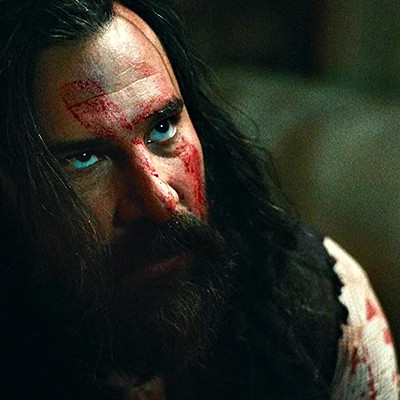It all started when Cuchullaine and Basha O'Reilly wrote a piece attacking the movie's veracity, in which they claimed that Frank Hopkins invented his life out of whole cloth--that he never rode horses and never engaged in an endurance race across the deserts of Arabia, Iraq and Syria, the event upon which Hidalgo is based.
Fusco, however, has a good deal of research on his side, including oral histories about Hopkins and his horse, Hidalgo, from then-residents of the Northern Plains reservations and among mustang ranchers. He also has the writings of J. Frank Dobie, who discussed Hopkins in his 1934 book on mustangs, and Albert Harris, who wrote two chapters about Hopkins in his 1941 Blood of the Arabs.
On the opposing side, Dr. Awd Al-Badi of the King Faisal Center for Research and Islamic Studies, says there's no record of a race across the Arabian desert, and Dr. Juti Winchester, curator of the Buffalo Bill Museum, found no reference to Hopkins working Buffalo Bill's Wild West show, as he is seen doing in the film. Further, there are no newspaper records of Hopkins' American endurance races. Fusco notes, though, that these races were illegal in the United States, so it's not like anyone was sending out press releases. The Arabian races, also, would not generally have been the stuff of international news, and there are surviving pictures of Hopkins on horseback, contrary to the O'Reillys' claim.
Of course, Hidalgo is about entertainment, and John Fusco himself says that Hopkins' writing includes "a dose of good ol' cowboy embellishment." On top of that, Fusco's script for Hidalgo has, he admits, "some good ol' cowboy embellishment, too." So, what the hell.
Fusco spent 12 years researching this pulp-fiction adventure story about an American mustang rider who travels to Arabia to engage in a race across the desert sands. As for how much of the race narrative is factual, Fusco says, "I had historical sign posts and then a lot of fucking sand," though he goes on to note that Hopkins "was a real person and was one of the first proponents of mustang preservation." That much is beyond dispute.
As to whether Hopkins ever raced across the Arab sands, rescued a princess from the clutches of evil bandits, fended off the temptations of a beautiful and wealthy Englishwoman or looked as good in chaps as Viggo Mortensen does playing him in the film, well, it's a movie, not a history book. Or, as Fusco puts it, "We try to cast a spell and hope the audience goes with (it)."
For my part, I thought the adventure worked well when it stuck to the pulp formula, and bogged down a bit when it became serious drama, a reflection on the dying West or an excuse for swelling music.
We can't blame Fusco for the music. The Western feel of the movie, though, is his, as it was in his earlier films like Spirit: Stallion of the Cimmarron, Young Guns and the shockingly titled Young Guns II. That one was shot in Tucson, where Hidalgo was written, and where Fusco spends a lot of time engaging in a love of "horses, the desert, cultural diversity and tequila." In that order, if you just shuffle a couple of items.
Since Fusco is the last of the Western screenwriters and, not surprisingly, one of the few people on Earth willing to actually talk to me, I thought it best to get his opinion on where film is going.
"What's discouraging to me," Fusco said, "are the stats and market research that convince the studios that we're only making movies for a young, male demographic."
I'd have to agree, since I assume that was what made Mel Gibson decide to turn the story of Jesus into an outtake from Grand Theft Auto, or, as Fusco put it in a way guaranteed to generate less hate mail, "It's all about money, and the studios want those boys, so that dictates what's being made."
Fusco's writing is pretty much old school. He's worked with Waldo Salt (Coming Home, Serpico, Midnight Cowboy) and Ring Lardner Jr. (Laura, M*A*S*H*, The Cincinnati Kid). Since he had first-hand knowledge of the great dead guys of screenwriting, I sought his opinion on who was good amongst the living. He picked Kevin Jarre, Randall Wallace and Michael Blake, authors of The Mummy, We Were Soldiers and Dancing With Wolves, respectively. In other words, guys who write the kind of movies Hollywood used to make.
The choices reflect both the strengths and shortcomings of Hidalgo. It takes itself a bit too seriously, and it aims at a form of adventure film that was more at home in the serials of the '30s and '40s than in modern cinema, but if you're looking for old-fashioned adventure without any post-modern self-consciousness, then you'll probably enjoy Hidalgo. While it has some treacly moments, it's also got cool swordfights, hot gunfights, two of the best actors in the world (Omar Sharif and Said Taghmaoui) and a refreshing absence of people beating the snot out of Jesus. I guess that's a lot to ask for in a film that's generating this much controversy.












